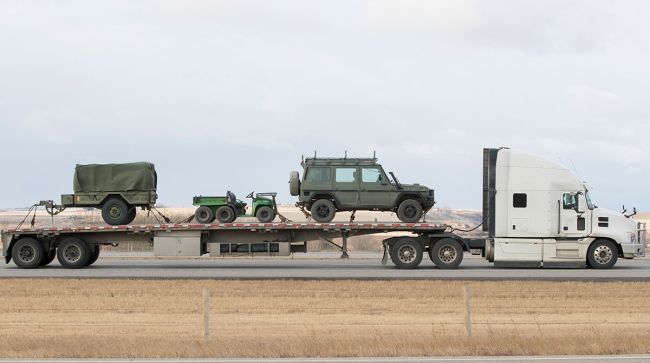The proposed legislation would update programs throughout the Pentagon. (Stefonlinton/Getty Images)
A proposal to further facilitate access for trucks to military bases and installations was approved as part of a defense policy bill in the U.S. Senate.
By a vote of 86-11, senators backed the must-pass legislation July 27, which would update programs throughout the Pentagon.
Included in the measure is a provision mandating the Department of Defense to arrive at certain standards for accessing military installations around the country. On July 14, the House of Representatives approved by a 219-210 vote its version of the defense bill, which included a similar provision. Sponsors in the Senate and the House will meet to reconcile differences in their overall legislative versions.
Proponents of the bill in the Senate explained the provision’s objective.
“The committee notes that there is no universal access standard across the services, which can lead to project delays for military construction projects, facilities repairs and household good moves,” according to a report prepared by the Armed Services committee, which accompanied the Senate bill.
Senate Majority Leader Chuck Schumer (D-N.Y.) touted the chamber’s work on passing the bill. The measure is officially known as the National Defense Authorization Act.

Schumer
“The NDAA is a down payment on one of the most important issues facing our country today, and that is defense. There are so many good provisions in this bill in terms of helping our troops and giving them the pay raises they need, making our defense stronger,” Schumer told reporters July 28. “And let’s not forget, there were other provisions added into the bill that are really important.”
Schumer continued, “This Senate is an example of how bipartisanship can work. And again, let me just reiterate, because it’s the contrast — the glaring contrast with the House — where the Republicans don’t work in a bipartisan way and just throw stuff on the floor that they know has no chance of passing; doesn’t help the American people one bit.”

Reed
Sen. Jack Reed (D-R.I.), the bill’s sponsor, added, “This bipartisan NDAA provides a historic level of support for our troops and their families, including the largest military pay raise in decades.
“It authorizes record-level investments in the people, platforms and programs that our forces need to safeguard the nation and advance U.S. interests worldwide.”
His counterpart on the House side, Rep. Mike Rogers (R-Ala.), praised his chamber’s passage of the bill.

Rogers
“The National Defense Authorization Act has been a critical part of our national security for over 60 years,” he said. “The NDAA provides our war fighters with the resources and authorities they need to provide for the defense of our nation. This legislation is vital as our nation is faced with unprecedented threats from our adversaries.”
Key stakeholders, such as American Trucking Associations, endorse policymakers’ focus on lingering issues pertaining to access to military installations and bases.

How effective have third-party services proved to be for fleets? Let’s find out with Michael Precia of Fleetworthy Solutions and Dan Rutherford with Summit Virtual CFO by Anders. Tune in above or by going to RoadSigns.ttnews.com.
“Such access standards must be consistent across military installations, include procedures to facilitate recurring unescorted access for ‘covered individuals,’ and require [Department of Defense] to accept credentials that already exist for non-DOD personnel, such as the Department of Homeland Security’s Transportation Worker Identification Credential,” ATA, ATA’s Moving & Storage Conference, ATA’s Government Freight Conference and the HomeSafe Alliance indicated in a recent letter to the congressional Armed Services panels.
“To be clear, truck drivers, motor carriers and household goods movers are [Department of Defense] partners, they are generally vetted by the federal government, and many have security clearances and/or other federally recognized security credentials,” the groups also said. For several years, these stakeholders have championed efforts meant to assist companies that move household goods for military and civilian personnel.
With Congress in recess through Labor Day, congressional leaders still need to schedule a vote on the bill’s final passage. Regardless of party control, the NDAA has traditionally cleared Congress for the president’s signature.






